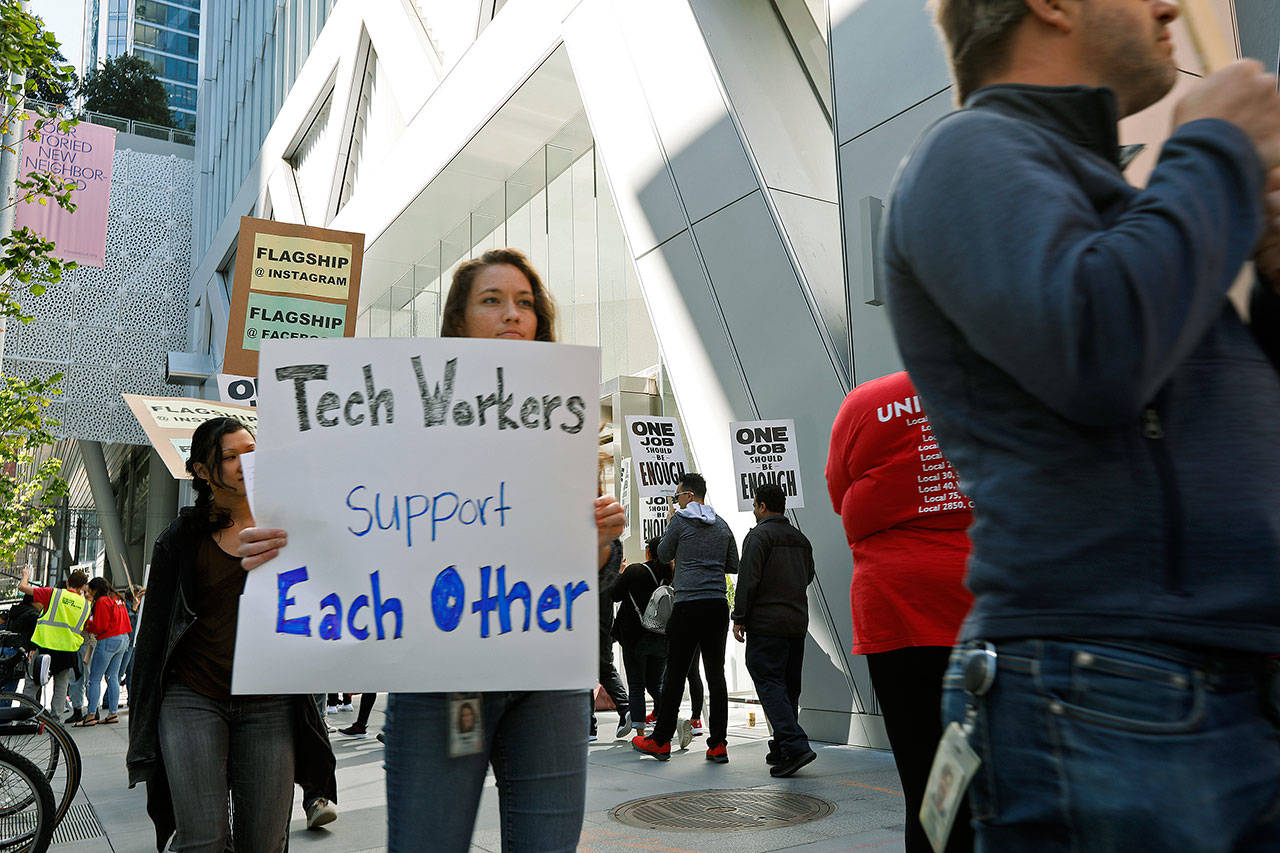By Samantha Maldonado / Associated Press
SAN FRANCISCO — When Liz O’Sullivan was hired at the New York City-based artificial intelligence company Clarifai in 2017, she felt lucky to find work at the intersection of two of her main interests: technology and ethics. Two years later, she encountered a moral dilemma.
Clarifai was developing aerial photography and object detection tools as one of several companies working on Project Maven, a Pentagon drone surveillance program. After talking to friends and colleagues, O’Sullivan realized this type of technology eventually could be used for autonomous weapons.
In January, she wrote to Clarifai CEO Matt Zeiler on behalf of a group of employees, asking whether the technology would be used for weapons and urging him to commit to a series of ethical measures. After Zeiler later acknowledged Clarifai likely would provide tech for autonomous weapons, O’Sullivan quit.
“I was very surprised and had to follow my conscience,” she said. Zeiler and Clarifai did not respond to a request for comment, though Zeiler has previously said Clarifai’s Project Maven involvement aligns with its mission.
O’Sullivan, 34, considers herself part of a “growing backlash against unethical tech,” a groundswell in the past two years in which U.S. tech employees have tried to remake the industry from the inside out — pushing for more control over how their work is used and urging better conditions, job security and wages for affiliated workers.
While some speak out and others sign petitions, workers are collectively taking action like never before:
— Amazon and Microsoft employees demanded the companies stop providing services to software company Palantir, which provides technology to the U.S. Army and Immigration and Customs Enforcement. Employees also have urged Amazon to transition to renewable energy.
— Following last year’s walkouts over Google’s handling of sexual misconduct cases, employees signed a letter protesting Project Dragonfly, a search engine that would comply with Chinese censorship.
— Salesforce, Microsoft and Google staff have protested their companies’ ties to Customs and Border Protection, ICE and the military.
Despite six-figure salaries, many tech employees are questioning the effects of their work and siding with their service- and contract-worker counterparts, who have pressed for better work conditions and pay.
“It’s unprecedented, both the magnitude of the power of these companies and the willingness of white-collar employees to shake themselves of the privilege that they have and to really see the impact of the work they’re doing,” said Veena Dubal, a professor at the University of California Hastings College of the Law who has interviewed dozens of tech workers involved in organizing.
They’re feeling emboldened because of global “existential crises” and the realization that tech companies “have more power than any multinational corporation has had in a long time,” Dubal said.
An Amazon spokesperson declined to comment on employee activism but said the Seattle-based company is committed to sustainability and provides good pay and benefits and humane warehouse conditions. A Microsoft spokesperson said the company, headquartered in the Seattle area, appreciates employee feedback, respects differing views and provides “many avenues for all voices to be heard.”
A Google spokesperson did not comment on specific incidents but said retaliation is prohibited and pointed to CEO Sundar Pichai’s previous statements on worker dissent. “There are many things good about giving employees a lot of voice,” he said at a November conference. “There are decisions we make which they may not agree with.”
Congress started aggressively scrutinizing the industry in recent years, and the Justice Department last month launched an investigation into Big Tech amid antitrust allegations. A recent Pew Research Center survey indicated Americans have increasingly negative views of tech’s effect on the country.
“As an employee in the tech sector right now, there is a fair bit of guilt or (asking), ‘What is my responsibility?’” said Kellie McElhaney, a Haas School of Business at UC Berkeley professor.
Google engineer Amr Gaber, 32, was among those at a recent demonstration in San Francisco for Facebook cafeteria workers seeking a new contract. White- and blue-collar employees are “all working people,” he said.
“If the (companies) can’t even treat the people who work for them well, then how can we expect them to have a positive impact on society?” Gaber said.
Some companies are listening.
Google and Facebook pledged to pay contract workers better and provide some benefits. Google ended forced arbitration for sexual misconduct cases after employees walked out, and declined to renew its Project Maven contract.
When employees asked Microsoft to cancel its ICE contract, CEO Satya Nadella clarified that the company was not contributing to family separations but supporting email, calendar and document systems.
A Salesforce spokesperson said conversations with employees led the company to create the Office of Ethical and Humane Use of Technology.
Such responsiveness is good for business and builds trust with customers and employees, McElhaney said.
“Those who are not responding are … missing a huge ocean liner that’s already left the dock,” she said.
Talk to us
> Give us your news tips.
> Send us a letter to the editor.
> More Herald contact information.

























